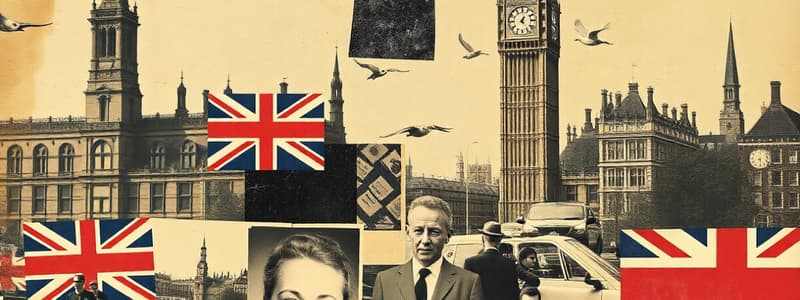Podcast
Questions and Answers
In the context of British societal values, which legal doctrine most directly underpins the protection of individual liberty against potential overreach by the state, ensuring a balance between governmental authority and the rights of the populace?
In the context of British societal values, which legal doctrine most directly underpins the protection of individual liberty against potential overreach by the state, ensuring a balance between governmental authority and the rights of the populace?
- Parliamentary Sovereignty, allowing Parliament to legislate on any matter without judicial review.
- The Royal Prerogative, vesting inherent discretionary powers in the Crown, exercised by ministers, without statutory authorization subject only to political accountability
- The principle of *Delegated Legislation*, granting broad powers to executive agencies without explicit parliamentary oversight.
- Judicial Review, enabling courts to assess the lawfulness of governmental actions and uphold individual rights enshrined in common law and statute. (correct)
Considering the principle of tolerance within British society, which philosophical framework directly challenges the notion of unconditional tolerance, positing that tolerance must have limits to prevent the undermining of the very values it seeks to protect?
Considering the principle of tolerance within British society, which philosophical framework directly challenges the notion of unconditional tolerance, positing that tolerance must have limits to prevent the undermining of the very values it seeks to protect?
- Cultural Relativism, which asserts that all cultural beliefs and practices are equally valid and should be respected.
- Utilitarianism, focusing on maximizing overall happiness and well-being for the greatest number of people.
- The Paradox of Tolerance, arguing that unlimited tolerance must lead to the disappearance of tolerance. (correct)
- Libertarianism, advocating for maximal individual freedom with minimal government intervention.
How do the 'customs and expectations' that underpin British values interact with the codified 'rule of law' to regulate behaviour and ensure social cohesion, especially in areas where formal legal structures are ambiguous or incomplete?
How do the 'customs and expectations' that underpin British values interact with the codified 'rule of law' to regulate behaviour and ensure social cohesion, especially in areas where formal legal structures are ambiguous or incomplete?
- Customs and expectations provide interpretive context to the rule of law, shaping its application and filling gaps in legal regulation to promote normative alignment. (correct)
- Customs and expectations systematically undermine the rule of law, fostering inconsistency and arbitrariness in legal proceedings.
- Customs and expectations operate independently of the rule of law, representing a separate sphere of informal social regulation.
- Customs and expectations are entirely superseded by the rule of law, rendering them irrelevant in legal and social contexts.
In a scenario where a community's traditional cultural practices directly conflict with principles of individual liberty as enshrined in British law, what legal and ethical framework is typically applied to adjudicate and resolve such conflicts?
In a scenario where a community's traditional cultural practices directly conflict with principles of individual liberty as enshrined in British law, what legal and ethical framework is typically applied to adjudicate and resolve such conflicts?
Considering the principle of 'participation in community life' as a cornerstone of British society, evaluate the socio-political implications of policies that promote civic engagement versus those that prioritize individual autonomy, especially concerning resource allocation and societal cohesion.
Considering the principle of 'participation in community life' as a cornerstone of British society, evaluate the socio-political implications of policies that promote civic engagement versus those that prioritize individual autonomy, especially concerning resource allocation and societal cohesion.
Flashcards
Democracy
Democracy
A system where citizens vote for representatives to make decisions.
Rule of Law
Rule of Law
The principle that everyone is subject to and accountable to the law, fairly applied and enforced.
Individual Liberty
Individual Liberty
The freedom to make your own choices and decisions without unnecessary interference.
Tolerance
Tolerance
Signup and view all the flashcards
Community Participation
Community Participation
Signup and view all the flashcards
Study Notes
- British society is built upon key values and principles.
- All UK residents should respect and support these values.
- These values appear in the rights, responsibilities, and privileges of British citizens and permanent residents.
- British values are based on history and traditions.
- British values are protected by law, customs, and expectations.
- Extremism and intolerance are not accepted in British society.
- Fundamental principles of British life include:
Democracy
- Democracy is a fundamental principle of British life.
The rule of law
- The rule of law is a fundamental principle of British life.
Individual liberty
- Individual liberty is a fundamental principle of British life.
Tolerance
- Tolerance of different faiths and beliefs is a fundamental principle of British life.
Participation in community life
- Participation in community life is a fundamental principle of British life.
Studying That Suits You
Use AI to generate personalized quizzes and flashcards to suit your learning preferences.
Description
Explore the core values underpinning British society, including democracy, the rule of law, individual liberty, and tolerance. Understand how these principles shape the rights, responsibilities, and expectations of UK residents. Learn how British values are protected by law and customs.




